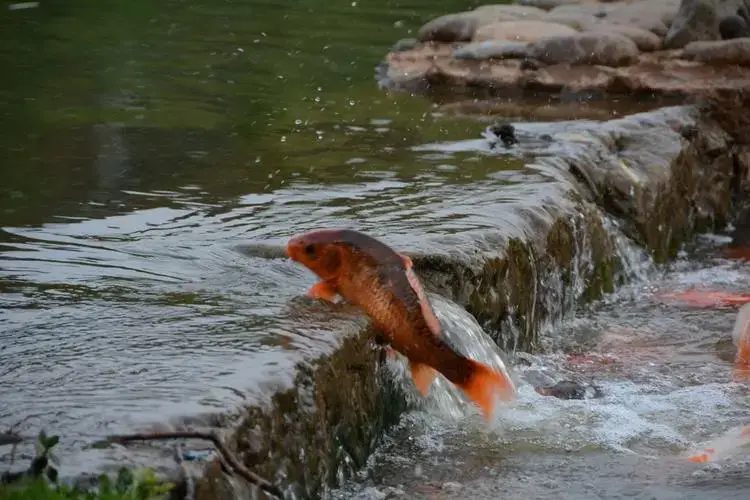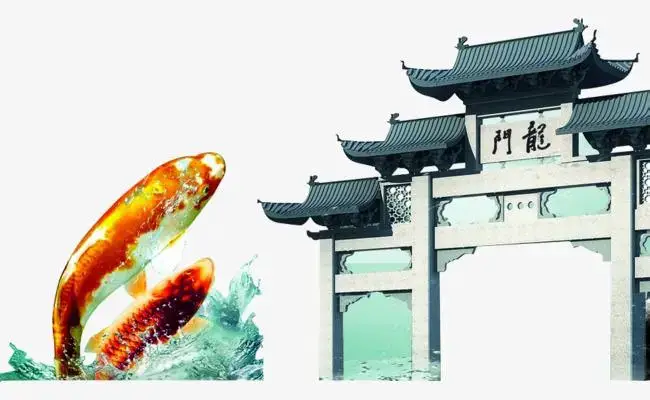“The Carp Leaping Over the Dragon Gate,” also known as “Fish Leaping Over the Dragon Gate” or “Fish Jumping Over the Dragon Gate,” is an ancient Chinese folk legend that originated in the region where the Longmen Grottoes are located, near present-day Luoyang, Henan.
According to the legend, due to the turbid waters of the Yellow River, most fish could not survive, except for the resilient carp. These carp, with golden scales due to the muddy environment, would swim upstream against the current during spring. When they reached the Dragon Gate, a waterfall near Luoyang, the fish would attempt to leap over it. Those that successfully jumped over were believed to transform into dragons, symbolizing success and overcoming challenges.
The story of the carp leaping over the Dragon Gate became a metaphor for perseverance, hard work, and the courage to dream big. With the implementation of the imperial examination system, the metaphor of “Fish Leaping Over the Dragon Gate” was used to signify success in the civil service examinations, giving the Dragon Gate a sacred status in the hearts of the people.

The legend of the carp leaping over the Dragon Gate has been passed down through generations and has also influenced other regions, including Japan. In Japan, it is a custom to hang carp streamers during Boys’ Day, expressing the wish for children to grow healthy and successful, much like the carp leaping over the Dragon Gate.
The Auspicious Pattern of Carp Leaping Over the Dragon Gate
The story of Emperor Yu carving the Dragon Gate and carp leaping over it is widely circulated in folklore, with mentions in ancient texts such as “Shui Jing Zhu” and “San Qin Ji.” The “Tai Ping Guang Ji,” Volume 466, under the entry “Dragon Gate,” cites “San Qin Ji”: “Longmen Mountain is at the border of Hedong. Yu carved the mountain, creating a door that is wide for over a mile. The Yellow River flows from the middle, and there are no carts or horses on either side… Every spring season, there are yellow carp, coming from the sea and various rivers, contending to reach there. In a year, those who leap over the Dragon Gate are no more than seventy-two. Upon the initial leap over the gate, there are clouds and rain following, and heavenly fire burns their tails from behind, transforming them into dragons.” The Qing dynasty’s Zhang Shu compiled “San Qin Ji” and further noted: “Large fish from rivers and seas gather below the Dragon Gate, numbering in thousands. Those that ascend become dragons, while those that fail remain as fish, thus the saying ‘Exposing gills at the Dragon Gate.’ ” In later folk legends, it became known as the carp leaping over the Dragon Gate. Tang dynasty poet Li Bai wrote in his poem “Presented to Cui, the Attendant”: “Yellow River’s three feet carp, originally residing in Mengjin, failing to develop horns to become dragons, they return accompanying the ordinary fish.” This metaphor was further extended to describe those who, with the support of influential figures, achieve prominence. In the era of imperial examinations, those who succeeded in the provincial examination and obtained the title of Jinshi were also referred to as “ascending the Dragon Gate.” The legend of carp leaping over the Dragon Gate serves as a picturesque expression of this beautiful tale, embodying the aspiration for soaring success and a fortunate turning point. Particularly for families relying on education and examinations to secure a bright future for their offspring, it is regarded as a symbol of imminent good luck.
Legend of Carp Leaping Over the Dragon Gate in History
According to legend, after Yu diverted the waters away from Yique, the flow became swift and turbulent. In the Yellow River at Mengjin (now under the jurisdiction of Luoyang), carp rested and swam against the current, following the waters of the Luo and Yi rivers upstream. When they reached the Dragon Gate at Yique (the present location of the Longmen Grottoes in Luoyang), the waves surged, and the carp leaped in abundance, attempting to overcome the obstacle. Those that successfully leaped became dragons, while those that couldn’t left a black scar on their foreheads. This led the Tang dynasty poet Li Bai to write in his poem “Presented to Cui, the Attendant”: “Three feet long, the carp in the Yellow River, originally residing in Mengjin, fails to develop horns to become a dragon, returning to accompany the ordinary fish.”
Since then, every late spring season witnesses countless golden carp swimming upstream against the current of the Yellow River, gathering beneath the Dragon Gate at Yique. They vigorously leap, and those that successfully clear the gate transform into majestic dragons soaring into the sky. The place where the dragons ascend is called the ‘Dragon Gate,’ and the saying goes, ‘A leap over the Dragon Gate multiplies one’s value a hundredfold.’
In artistic representations, the myth of carp leaping over the Dragon Gate is often portrayed using the image of a fish with the head of a dragon. This symbolizes the carp’s struggle in the surging river, spewing water beneath the Dragon Gate, and the triumphant appearance of the dragon-fish soaring into the sky with outspread wings.
Mythical Tale of the Carp Leaping Over the Dragon Gate
In the ancient mythology of China, the story of the carp leaping over the Dragon Gate is a narrative of profound impact. It tells the story of a carp that successfully leaps over the Dragon Gate and transforms into a dragon. This story is not only rich in symbolic meaning but also carries profound philosophical insights.

The tale originates from ancient China, where in the distant past, there existed a vast ocean known as the “Sky Sea.” In this ocean, countless fish resided, and among them was a brave and curious carp named “Golden Scale.” Although Golden Scale was just an ordinary carp, it harbored aspirations and ideals that set it apart from the others. It often roamed the ocean, dreaming of leaving the mundane waters to explore a broader world.
One day, Golden Scale heard of a towering Dragon Gate in the distant east. Legend had it that by leaping over the Dragon Gate, one could transform into a dragon, gaining boundless power and eternal life. Golden Scale made a determined decision to challenge this legend and seek its own destiny.
Thus, Golden Scale embarked on a long journey. It traversed numerous treacherous straits and crossed tumultuous waves. During its journey, Golden Scale encountered many other fish, including brave sharks and wise octopuses. Each had their own stories and dreams, but they were all inspired by Golden Scale’s courage and determination.
After countless hardships and challenges, Golden Scale finally arrived at the foot of the Dragon Gate. The Dragon Gate stood tall and majestic, emitting a dignified aura. Though a bit fearful, Golden Scale knew it had reached a crossroads of destiny, and only by pressing forward could it realize its dream.
Summoning courage, Golden Scale made a powerful leap towards the Dragon Gate. In that moment, the sky roared with thunder and lightning, as if resonating with the earth. Golden Scale drew a dazzling golden streak in the air and successfully leaped over the Dragon Gate.
Upon descending back into the water, Golden Scale realized it was no longer an ordinary carp but had transformed into a mighty dragon. Its scales shimmered with a golden glow, and majestic horns adorned its head. It understood that it had fulfilled its dream and become a true dragon.
However, Golden Scale did not become arrogant or complacent. It remembered the friends who had accompanied it through the challenging journey and decided to return to the ocean to find them, sharing its joy and success.
Back in the ocean, Golden Scale’s appearance caused a sensation. All the fish cheered for its success. Golden Scale shared its adventurous experiences and inner journey with them, encouraging them to bravely pursue their dreams.
As time passed, more and more fish were inspired by Golden Scale. They embarked on journeys to challenge the mysterious Dragon Gate. Golden Scale remained by their side, offering support and assistance.
In the end, the ocean became more prosperous and vibrant. The fish encouraged and helped each other, growing and progressing together. Golden Scale, as their leader and spiritual guide, led the entire fish community towards a brighter future.
While this story is a mythical legend, the philosophical insights it carries are profound. It teaches us that with dreams, courage, and perseverance, one can overcome all difficulties and challenges. Simultaneously, it emphasizes the importance of unity, mutual assistance, and friendship. Only when we join hands with others and grow together can we move towards a more beautiful future.
Reference Material:
“Ancient Brick Carvings Narrate the Flow of Years”: Carp Leaping Over the Dragon Gate. Luoyang Net [Accessed on 2020-07-14]
Yique, Beautiful Yu’s Achievements – The Formation of Dayu and Yique. Longmen Grottoes [Accessed on 2020-07-14]
Historical Verification of Longmen Grottoes. Luoyang Municipal Cultural Relics Bureau [Accessed on 2020-07-14]
The Story of Fish Leaping Over the Dragon Gate in Hezhou Version. Hezhou College [Accessed on 2019-07-12]
In Which Year Did Fish Leaping Over the Dragon Gate Begin? Hejin Release [Accessed on 2019-07-12]
